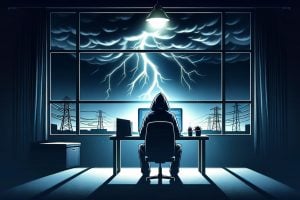
As both extreme weather and cyber-attacks become increasingly common, a study led by a Johns Hopkins engineer warns of a new threat: malicious hackers strategically targeting power grids during the chaos of extreme weather such as a heatwave.
“Consider the following scenario—what if an adversarial actor learns that there will be a natural disaster, such as a hurricane, or an extreme weather event like a heat wave that affects critical infrastructure systems and times their cyber-attack to be launched when the system is already stressed?” asks Yury Dvorkin, associate professor in the Whiting School of Engineering’s Department of Civil and Systems Engineering and a leader of the Ralph O’Connor Sustainable Energy Institute’s Electric Power Innovation for a Carbon-free Society Center (EPICS).
Dvorkin and colleagues at the University of California, Berkeley, and the New York University (NYU) Center for Urban Science and Progress (CUSP) developed a cutting-edge two-stage model to analyze the fallout of such compound cyber-physical threats on U.S. electric power networks and the broader economy. By simulating scenarios involving heatwaves, cyber-attacks, and their hazardous combination, the study, which appears in Applied Energy, offers alarming insights.
“We found that the resulting impact from compound threats increased by more than three times compared to a standalone cyber-attack, leading to 12% of electricity demand going unmet overall. The compound cyber-physical threats also exacerbate economy-wide losses across sectors, which for different attack strategies lead to daily GDP reductions of up to 3.1%,” said Dvorkin.
In one simulation for Long Island, New York, the team concluded that a 9% increase in demand during a heatwave might not initially cause disruptions in the area’s power grid and a cyber-attack alone could result in 4% of electricity demand going unmet. But when a cyber-attack is timed with a heatwave, the unserved load in Long Island escalates to 12%, impacting nearly 198,000 customers.
The study also uncovers the ripple effects of compound cyber-physical threats on the economy. According to the team’s model, state and local government organizations could see a 37% decrease in economic productivity in the compound scenario, highlighting the far-reaching consequences of power disruptions. “With countries increasingly pursuing electrification as the main strategy in the global effort to decarbonize, society overall is becoming more vulnerable to electric power outages and compound threats,” Dvorkin said.
“One thing to note is that because compound threats have a very large and hard-to-analyze risk surface and cyberwarfare continues to grow in its sophistication, additional studies will be imperative to understand the full impact of cyber-physical threats based on varying attack scenarios and vulnerabilities caused by climate change,” he said.
Study co-authors were Luis Ceferino of UC Berkeley, and Charalampos Avraam of NYU CUSP. Avraam earned his doctorate in civil and systems engineering at the Whiting School in 2021.